After four years of angry tweets and deepening partisanship, of two presidential impeachments and an election that ignited a siege, it sounds almost too naive to suggest that the road to healing these Divided States of America is as simple — and as complicated — as this: It begins with one conversation at a time.
That is the sentiment voiced by an array of faith leaders, political scientists, community organizers and ethicists, when asked how to resume the pursuit of a more perfect union.
“It sounds really silly, but I think we just have to spend more time listening to one another than talking at one another, ” said Marisa Abrajano, a political science professor and provost of the Earl Warren College at UC San Diego.
She and others spoke of nudging Americans out of their silos, where they’ve been isolated by culture, color and creed for far too long, of coaxing them to a shared table and persuading them to reopen their hearts and minds.
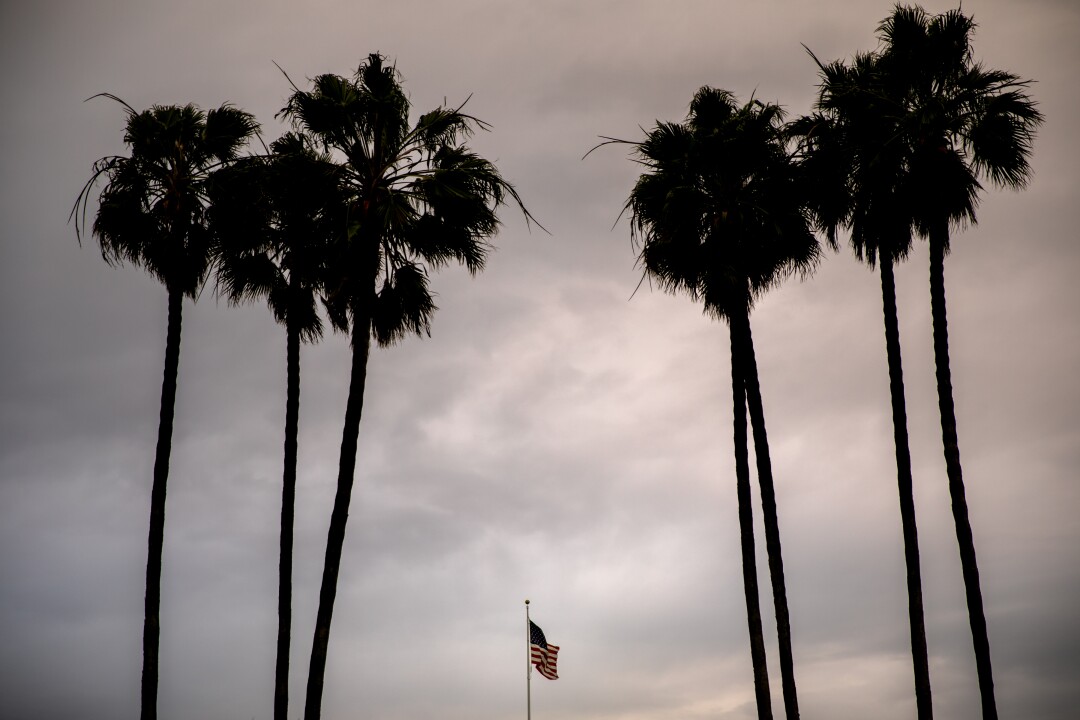
At Fort Rosecrans National Cemetery, two sets of palm trees stand divided, bound in the middle by a singular force: the Star-Spangled Banner.
(Sam Hodgson / The San Diego Union-Tribune)
They proposed small groups, panel discussions, joint meetings of congregations and civic assemblies to work toward a vision of a shared future that promises to treat others the way they want to be treated, reject violence and agree that words — and truth — matter.
And while newly inaugurated President Joe Biden passionately called for unity, some cautioned that perhaps the focus should be more about forming community.
“Unity implies that somehow we have to agree together and be the same,” explained Floyd Thompkins, CEO of the Foundation for Justice and Peace in San Francisco. “That’s crazy. You can’t even do that in families.
“Community involves relationship, responsibility, affection — all those things,” added Thompkins, who has spent much of his life building bridges between diverse groups of people. “That is what we should be striving for. That seems so pollyannaish, but that is exactly what a functioning country does.”
But before exploring a way forward, it might be prudent to first look in the rearview mirror.
Some history
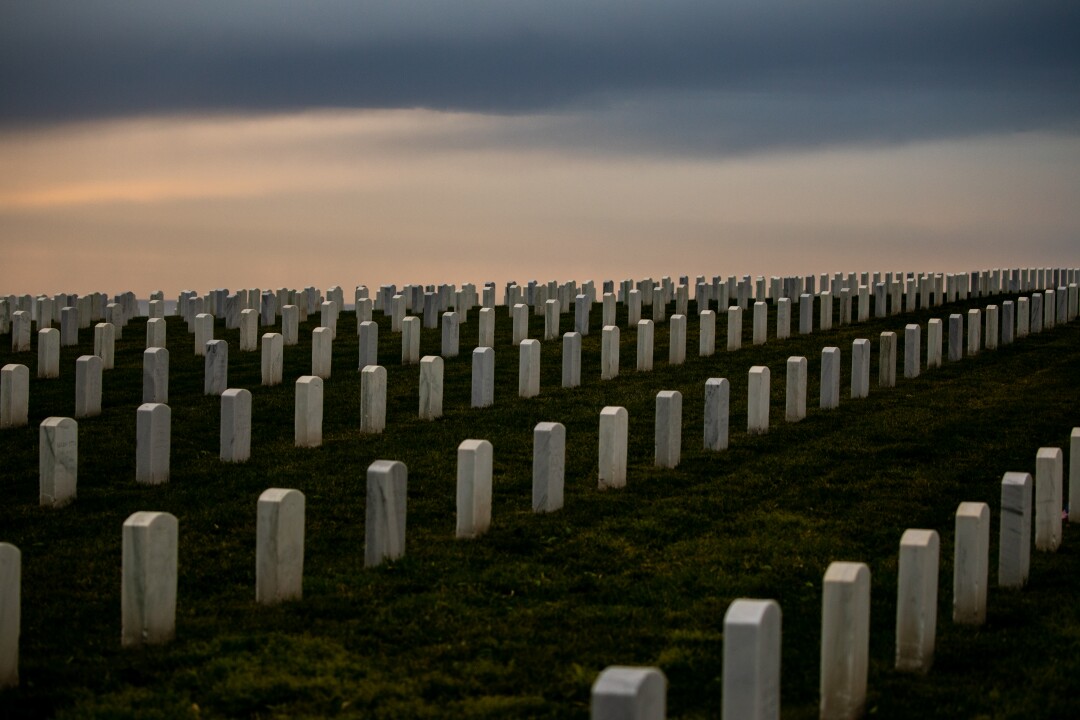
At Fort Rosecrans National Cemetery, the air is thick with the nation’s past struggles. “Our better angels have always prevailed” through our trials, President Joe Biden said in his speech.
(Sam Hodgson / The San Diego Union-Tribune)
Carl Luna, a political scientist who heads the Institute for Civil Civic Engagement, a partnership between the University of San Diego and Mesa, Miramar and San Diego City colleges, traces the roots of this modern discord to the 1960s, when the prosperity achieved after World War II began to break down.
“And once it did,” he said, “we’ve been finger-pointing ever since then.”
White Americans have grown anxious about losing their standard of living or their social status. Rural America has been in a decline for decades. And despite the civil rights successes in the 1960s, systemic racism persists.
Then there’s social media, which until only recently has been an unfiltered Wild West of conspiracy theories and falsehoods. Luna called it “the equivalent of smoking cigarettes in our national debate. And it’s given us collective cancer.”
All this created “the perfect storm just waiting for a demagogue to come to power who will tell people exactly what they want to hear and make them feel good while not really fixing things. Regrettably, I think history will show Donald Trump was that demagogic figure.”
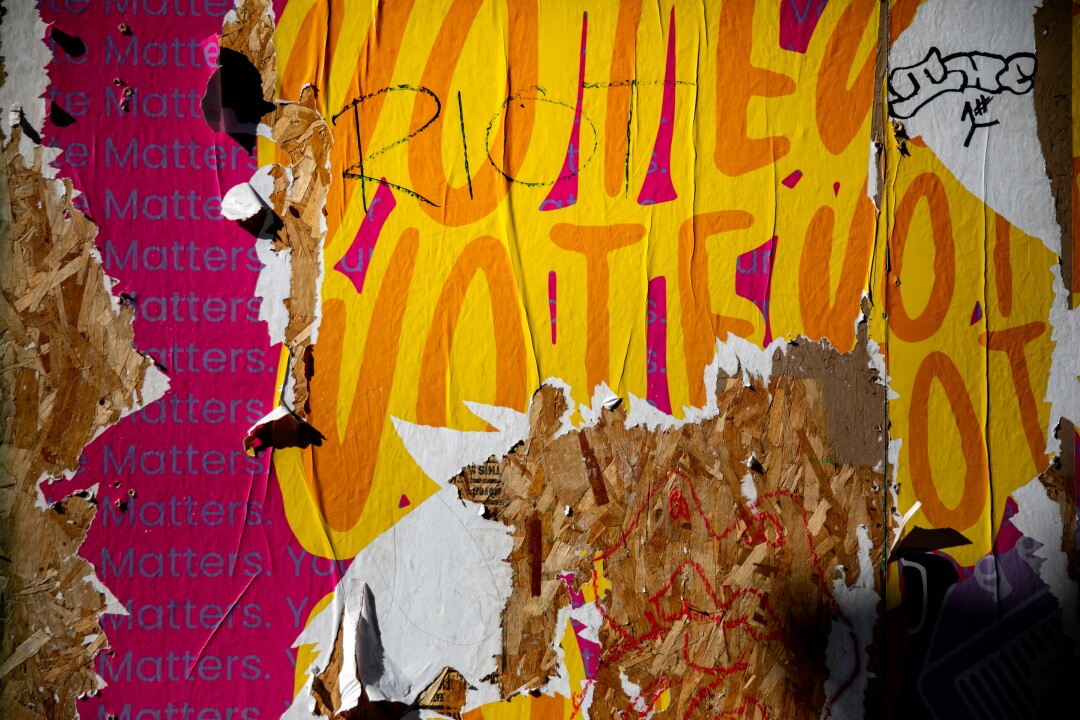
A mural in downtown San Diego implored citizens to “Vote, Vote, Vote …” Someone had a different path forward, scrawling the word “Riot” across the plywood planks.
(Sam Hodgson / The San Diego Union-Tribune)
After losing his bid for re-election to the White House in November, Trump convinced supporters that there was massive fraud at the ballot boxes — despite several recounts and dozens of court decisions to the contrary. On Jan. 6, the uncivil war turned deadly, as thousands of his loyalists stormed the U.S. Capitol, hoping to somehow overturn Congress’ certification of the Electoral College results.
As much as he favors bringing people together to talk this out, Luna worries the country isn’t ready. Polls show a majority of Republicans still don’t believe the election was legitimate and a significant slice downplay the capitol attack. Authorities, who locked down Washington, D.C., for the inauguration, warn there may be more violence.
“I think the real conversations about reconciliation are going to have to take place in the summer or fall, when things start to get better,” he said. “We are in the thick of things right now. We are throwing crockery at each other in the national kitchen. You’ve got to let that burn out.”
In the meantime, the consensus is that two other matters need to be resolved. One involves accountability and the other has to do with the nearly year-old pandemic that has upended the economy, redefined normal and killed more Americans than the populations of El Cajon, Escondido and Carlsbad combined.
Crime and punishment
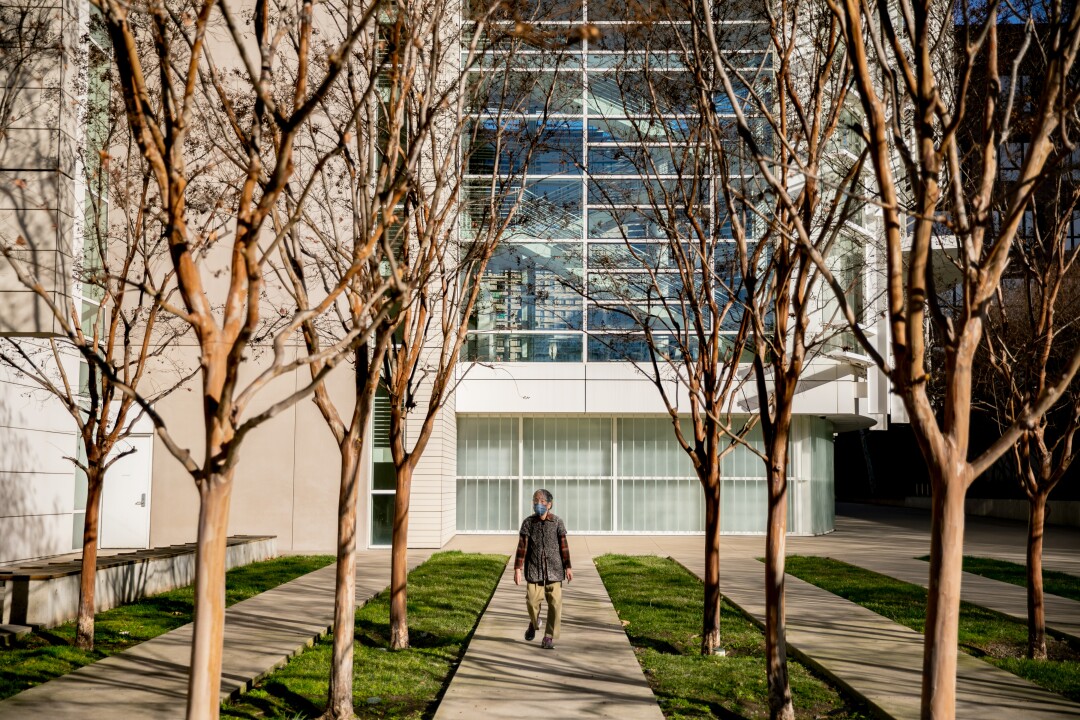
A person wearing a face shield to protect against COVID-19 walks outside the federal courthouse in downtown San Diego.
(Sam Hodgson/The San Diego Union-Tribune)
Jim Winkler, president of the National Council of Churches in Washington, D.C., whose members span 38 denominations, is adamant: “There can be no healing without accountability.”
He quotes Martin Luther King, Jr., about how peace is not merely the absence of tension, but the presence of justice.
“As people of faith, the process is called repentance,” Winkler said. “The process of truth-telling and acknowledgement and intention to change.”
The Rev. D. Rebecca Dinovo, a priest at St. James-by-the-Sea in La Jolla who also works on peace and justice issues for the Episcopal Diocese of San Diego, said arguments that people should simply let bygones be bygones and move on are wrong-headed.
“The wounds run too deep,” Dinovo said. “The hurts are too significant. The wrongs done are too big, We’re going to have to see some amount of justice served on some level in order for us to move forward.”
She added: “If you sweep it under the rug, it’ll just come back up in another instance.”
But Dinovo acknowledged that the conversations must not only be about blame.
“That’s where the olive branch needs to be extended — about how we dialogue and how we are talking to each other. Why would I engage in a process if I’m just going to be punished? We have to reward people for good behavior, too.”
Last summer, she started calling faith leaders across the county to express her fears that trouble was brewing over the upcoming election and there could be violence. Out of those calls came a coalition of churches, mosques and synagogues who continue to pray for racial justice, peace and nonviolence.
Dinovo feels strongly about the need for political and community leaders to model civility. And she denounces the mingling of Christian rhetoric with the White supremacy and nationalism exhibited in this month’s violence.
“They are creating the narrative in which they are the righteous cause for God,” Dinovo said. “It almost feels like we’re back at the Crusades or something.”
How and who
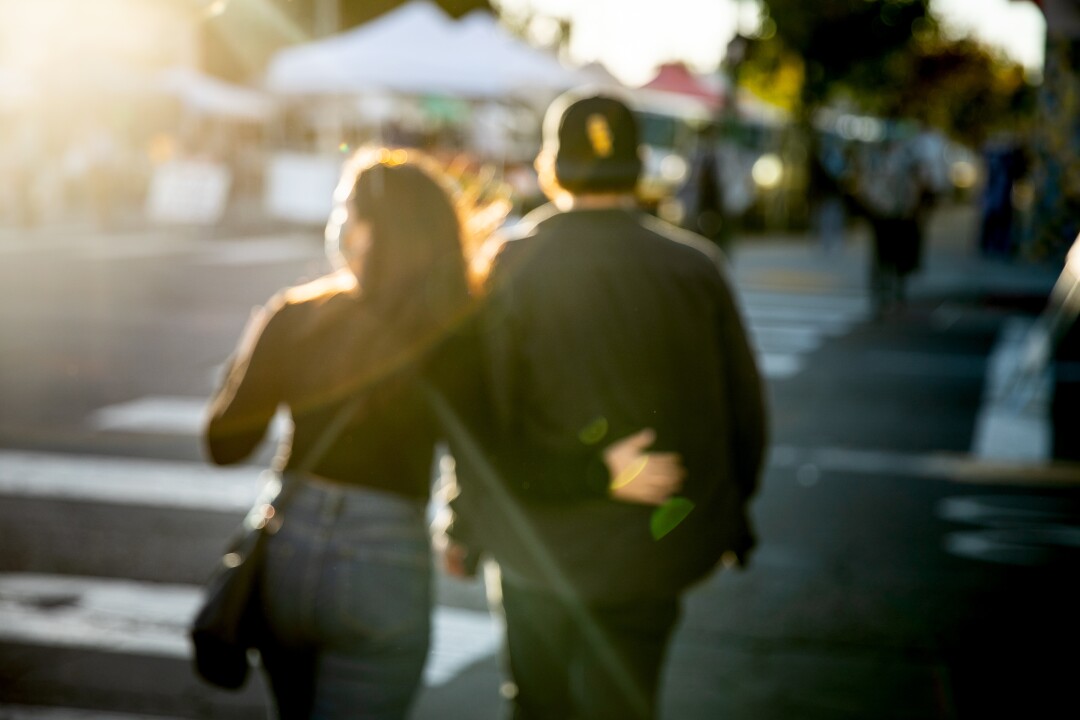
A couple crosses the street as the sun goes down in North Park on Thursday, the day after President Joe Biden’s inauguration.
(Sam Hodgson / The San Diego Union-Tribune)
In the 1990s, Byron Bland was in Northern Ireland helping to facilitate community conversations to foster peace in the conflict-riddled region. Among the things he learned: healing comes about by creating a vision of a shared future.
“How do you imagine yourself with people who are different from you?” explained Bland, a senior consultant at Stanford University’s Center on International Conflict and Negotiation.
Another question is this: “Are you better off in peace than you were in conflict? And the answer to that has to be made yes,” he said. “I have to feel that it’s worth enduring those unfairnesses for the benefit of living together. We do it all the time in families and communities because we feel the relationships are more important than the unfairnesses.”
Bland believes the dialogues here must include as many voices as possible — from the left, right and center — and especially those who hold the power “to wreck things.”
As for the tone of these conversations, besides being civil, more than one expert said they should emulate the Golden Rule of treating others the way they would like to be treated. And they have to include the really tough issues, like the deep partisan division and America’s systemic racism.
“There was a lot of talk that we were post-racial after President Obama was elected in 2008 and that is just utterly false,” said UCSD’s Abrajano. “We are not there, and I think that for people to deny or not think that race is a fundamental cleavage in our society, they don’t really understand the history of this country.”
Changing hearts and minds also will take a moral commitment at the top.
“Maybe that’s too idealistic,” she admitted, “but at a very minimum, we need to have our president be the one to be an example and to state what’s right and what’s wrong.”
Finally, COVID-19
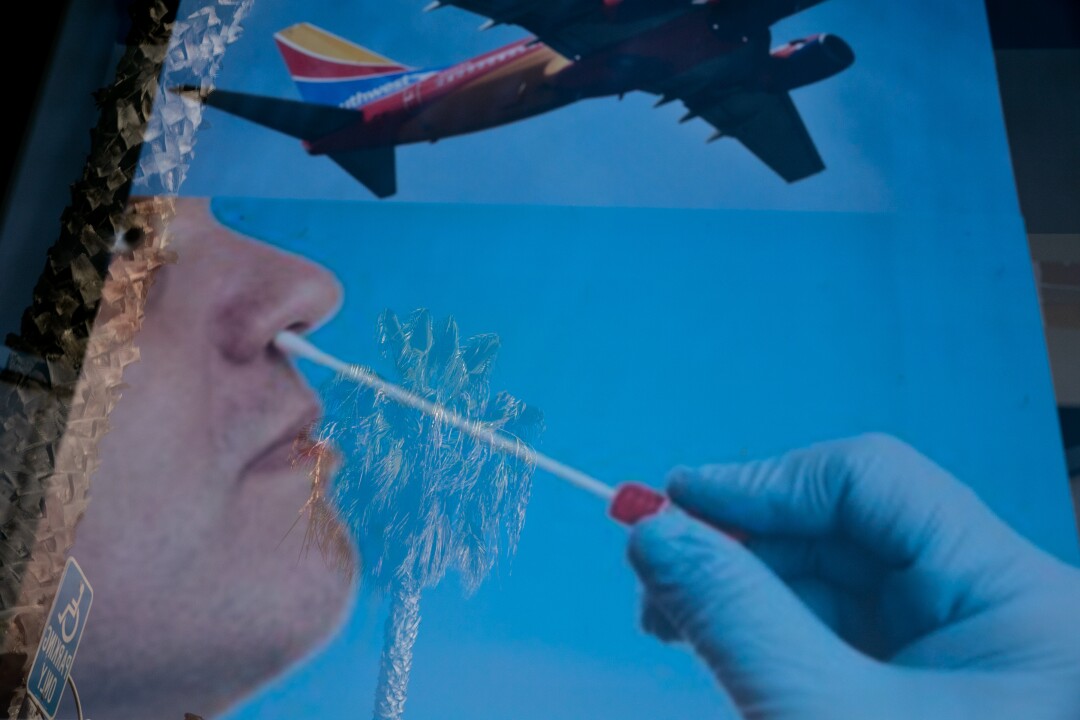
A palm tree is reflected in an advertisement declaring that COVID-19 testing could be the ticket to traveling, as seen on the side of an urgent care center and testing facility in Pacific Beach on Thursday, Jan. 21, 2021.
(Sam Hodgson/The San Diego Union-Tribune)
Bishop Robert McElroy, spiritual leader of nearly 1.4 million Roman Catholics in San Diego and Imperial counties, said he is hopeful that the shared suffering of COVID-19, which has claimed more than 400,000 American lives, will finally become a unifying force. A way to find “in our woundedness, a path to embracing one another again.”
McElroy said it’s tragic that the pandemic has become so divisive and politicized.
“We have got to move it out of that frame of reference altogether and to say, ‘This is a crisis which has hit our country badly.’ ”
What does he think of the suggestions that healing comes one conversation at a time?
“This is the quintessential way for us to heal, I think.”
When parishes have tackled such searing subjects as immigration and racism, McElroy said it is through the sharing of stories face-to-face “that we have found the most progress.”
Ignoring problems doesn’t heal anything.
“We need to dialogue about them. We need to understand one another and we need to have a real sense of compassion.”
Then the bishop added this: “If there’s one thing I would love to see is the country come to a deeper sense of compassion for one another.”
With the pandemic still very much here, the face-to-face gatherings will have to wait. But maybe not so the conversations or the compassion. It’s that simple — and that complicated.

On the eve of President Joe Biden’s inauguration, a cloudy horizon leaves as many questions as answers.
(Sam Hodgson / The San Diego Union-Tribune)
Dolbee, who writes a biweekly column for this paper’s Sunday Arts+Culture section, is the former religion and ethics editor of The San Diego Union-Tribune and a former president of the Religion News Association. You can reach her at sandidolbeecolumns@gmail.com
How does a nation heal? One conversation at a time - The San Diego Union-Tribune
Read More
Bagikan Berita Ini

















0 Response to "How does a nation heal? One conversation at a time - The San Diego Union-Tribune"
Post a Comment